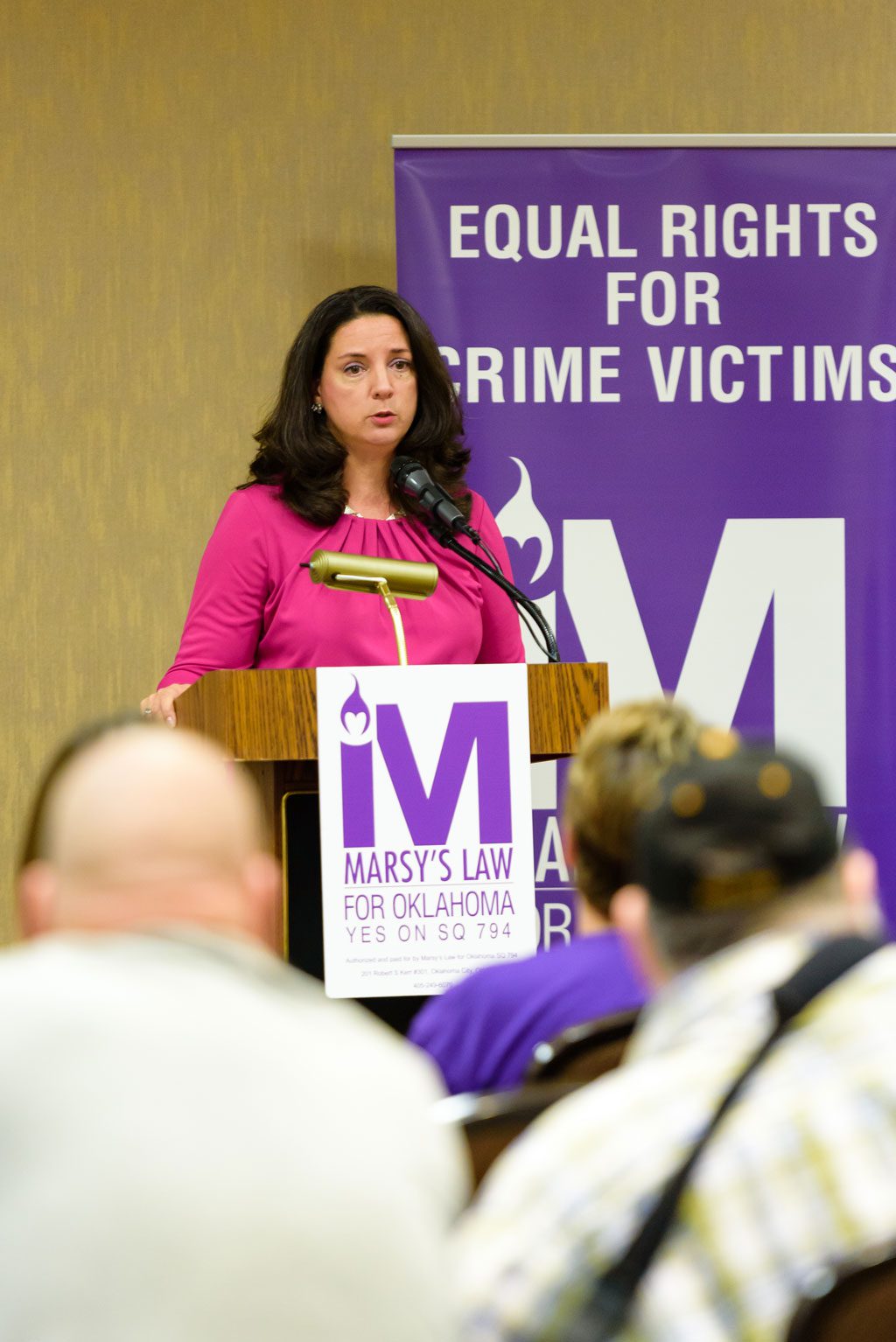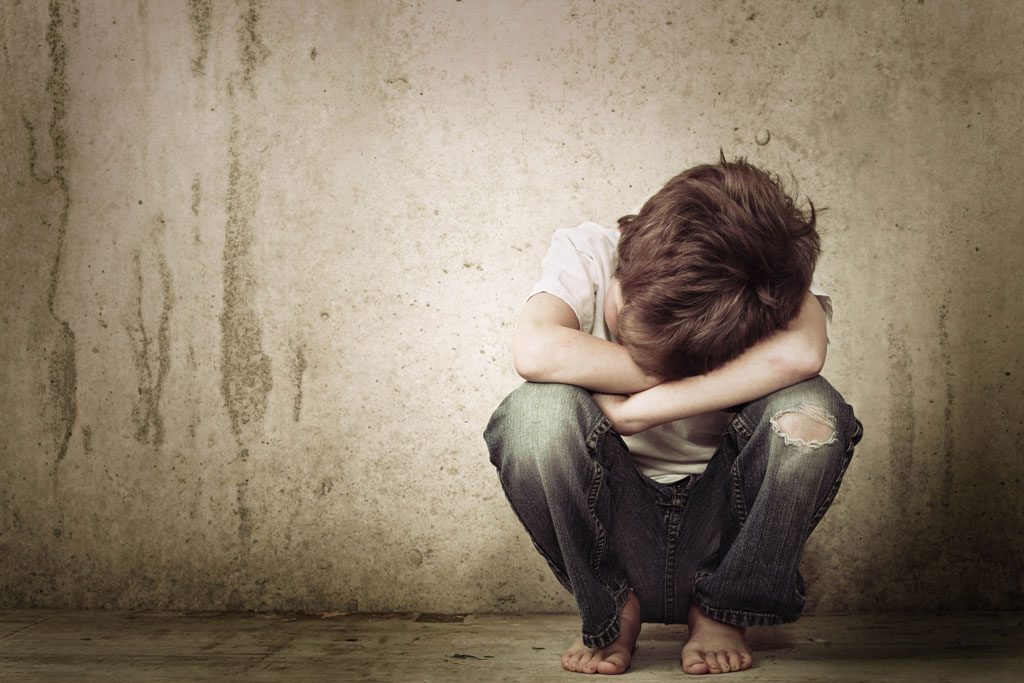In 2014, a Muskogee police officer violated a legal protective order obtained by his estranged wife, Misti Martin-Sullins, rammed her car off the road, kidnapped her at gunpoint and forced her to perform sex acts. Prosecutors dropped all sexual assault charges before he was convicted of three other felonies and given a 10-year deferred sentence.
He served 48 days in jail – mostly on weekends.
“When you speak out,” Martin-Sullins says, “and you get slapped in the face and other victims [of domestic abuse] see there is no justice, they don’t speak out either.”
Domestic abuse/violence is the world’s most prevalent and under-reported crime. Crime victims and proponents of Marsy’s Law – named for a California collegian killed by her ex-boyfriend – intend to remedy that through an amendment to the Oklahoma constitution. The bill sailed through both houses of the legislature in April, and State Question 794 will be up for a general vote in November.
Kim Moyer, state director for the Marsy’s Law Project, extols passage of the bill as a landmark for crime victims, particularly those of domestic abuse.
“We are one step closer,” she says, “to extending constitutional rights to all crime victims.”
Marsy’s Law originated after a former boyfriend shot to death Marsalee “Marsy” Nicholas, a senior at the University of California-Santa Barbara in 1983. A week later, the Nicholas family returned from visiting Marsy’s grave and were alarmed to encounter the accused killer released on bail.

Henry Nicholas, Marsy’s brother, organized a campaign to enact a constitutional bill of rights for victims of crime. Marsy’s Law passed as an amendment to the California constitution in 2008. More than 30 states offer constitutional rights to victims, but Marsy’s Law seeks to elevate them to constitutional rights equal to those of the accused and cannot be altered or dismissed. At least 20 states since then, including Oklahoma, have either enacted Marsy’s Law into their constitutions or are in the process of doing so.
The amendment requires law enforcement to inform victims of “Marsy’s Rights” in the same way that offenders are advised of their Miranda rights. A “Marsy’s Card” enumerates these rights in the judicial process, including legal standing before the court, protection from the defendant, notification of all court proceedings, the opportunity to be present in court, privacy, and the court’s obligation to treat the victim with dignity and respect.
Moyer says if the Oklahoma constitutional amendment were to pass, more abuse victims would come forward and trust the criminal justice system.
Victims of abuse often do not report domestic crimes for many reasons: the sake of children, nowhere else to go, financial problems, guilt or shame. Marsy’s Law applies to all crime victims, but it was originally intended to protect victims of abuse by encouraging them to come forward into a supportive judicial system.
Former victims, such as Martin-Sullins and Oklahoma teacher Virginia Lewis, want to pave the way for other victims to seek help through the criminal justice system and from domestic abuse organizations and hotlines.
“I speak out now because I know abused women may think it’s impossible to walk away,” Martin-Sullins says. “But I want them to know they have the strength and help to do it.”
Lewis was sexually molested by her father for more than five years, starting when she was 11. She held her pain and trauma inside for 34 years before she spoke in support of Marsy’s Law at a 2017 rally.
“Going through hell takes an eternity to process and cope with,” Lewis says. “It’s much easier to report a stranger who has stolen your purse than to report someone you loved and trusted for murdering your soul.”
According to a 2015 report by the National Coalition Against Domestic Violence, one in three women and one in four men will, in their lifetimes, be victims of domestic abuse, ranging from physical, sexual, emotional and economic abuse to coercion, intimidation, isolation, threats and humiliation.
Intimate partner violence accounts for 15 percent of all violent crimes in the United States. Domestic victim hotlines nationally receive a daily average of 20,000 calls. Police departments receive more than that.
“The average victim leaves seven times before she leaves for good,” says Martin-Sullins.
And law enforcement officers’ safety is also at risk when responding to domestic violence calls.
“You never know what to expect on a domestic dispute call,” retired Tulsa officer Craig Roberts says. “It can range from a family brawl to a homicide.”
According to 2015 Oklahoma State Bureau of Investigation statistics, Oklahoma ranks sixth in the nation for women killed by men in single victim-single offender incidents. Domestic abuse in one form or another accounts for more than 20 percent of all Oklahoma homicides.
Female and male victims were almost equally represented in these statistics – 50.5 percent female, 49.5 male, with 76 percent of male victims killed by other men.

Children and lifelong suffering
Research into children who grow up subjected to repeated exposure to domestic violence shows an increase in the likelihood of their becoming victims or perpetrators. Susan Sharp, professor of sociology at the University of Oklahoma, focuses on female criminal behavior and why Oklahoma is a long-standing No. 1 in rates of female incarceration. Many of these women’s childhoods were wrought with abuse.
The state imprisons 151 women for every 100,000 Oklahoma women, more than twice the national average, according to Bureau of Justice statistics.
“We have conditions that contribute [to female incarceration] through drug use, high rates of domestic violence, child abuse, lack of social services and very harsh laws,” Sharp says. “Three-fourths of women I surveyed each year [in prison] reported physical or sexual abuse [or both] in childhood. About 70 percent reported being victims of intimate partner violence. They also came from chaotic households where someone had a drug problem, mental illness and so forth.”
Domestic abusers and mass shootings
Domestic abuse/violence is an important factor in many mass shootings. The Congressional Research Service counted 317 mass shootings in the U.S. from 1994 to 2013, with more high-profile shootings occurring since then. Perpetrator backgrounds reveal that more than half of the shooters had histories of domestic violence.
Before Devin Patrick Kelley massacred 26 people at the First Baptist Church of Sutherland Springs, Texas, in November, he was convicted by the U.S. Air Force for beating his wife and fracturing his infant son’s skull. He served a year in confinement before receiving a dishonorable discharge.
Cedric Ford shot 17 people in Newton, Kansas, in 2016, shortly after a restraining order was issued against him for abuse of his former girlfriend.
Omar Mateen, who murdered 49 at the Pulse Night Club in Orlando, had physically abused his wife for years.























